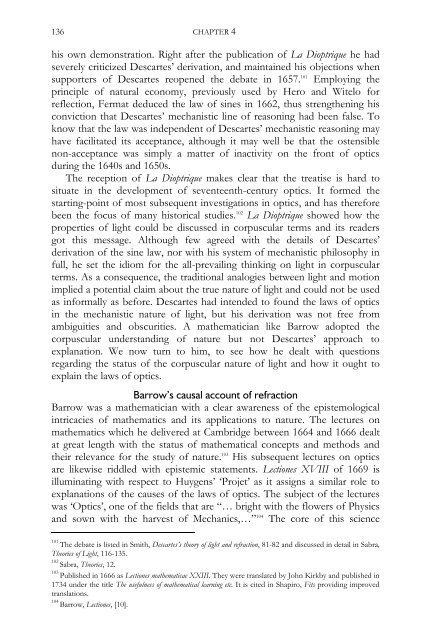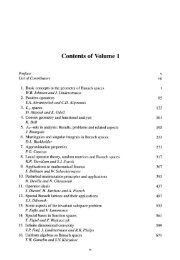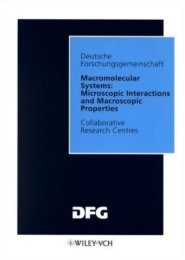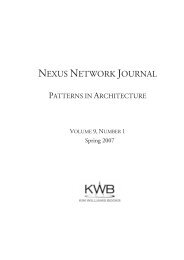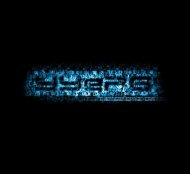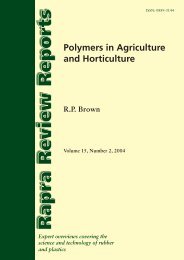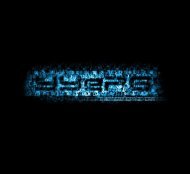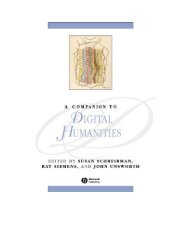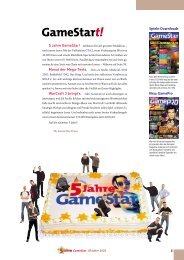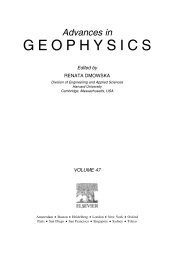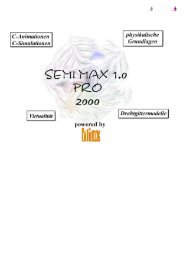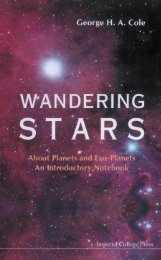Lenses and Waves
Lenses and Waves
Lenses and Waves
Create successful ePaper yourself
Turn your PDF publications into a flip-book with our unique Google optimized e-Paper software.
136 CHAPTER 4<br />
his own demonstration. Right after the publication of La Dioptrique he had<br />
severely criticized Descartes’ derivation, <strong>and</strong> maintained his objections when<br />
supporters of Descartes reopened the debate in 1657. 101 Employing the<br />
principle of natural economy, previously used by Hero <strong>and</strong> Witelo for<br />
reflection, Fermat deduced the law of sines in 1662, thus strengthening his<br />
conviction that Descartes’ mechanistic line of reasoning had been false. To<br />
know that the law was independent of Descartes’ mechanistic reasoning may<br />
have facilitated its acceptance, although it may well be that the ostensible<br />
non-acceptance was simply a matter of inactivity on the front of optics<br />
during the 1640s <strong>and</strong> 1650s.<br />
The reception of La Dioptrique makes clear that the treatise is hard to<br />
situate in the development of seventeenth-century optics. It formed the<br />
starting-point of most subsequent investigations in optics, <strong>and</strong> has therefore<br />
been the focus of many historical studies. 102 La Dioptrique showed how the<br />
properties of light could be discussed in corpuscular terms <strong>and</strong> its readers<br />
got this message. Although few agreed with the details of Descartes’<br />
derivation of the sine law, nor with his system of mechanistic philosophy in<br />
full, he set the idiom for the all-prevailing thinking on light in corpuscular<br />
terms. As a consequence, the traditional analogies between light <strong>and</strong> motion<br />
implied a potential claim about the true nature of light <strong>and</strong> could not be used<br />
as informally as before. Descartes had intended to found the laws of optics<br />
in the mechanistic nature of light, but his derivation was not free from<br />
ambiguities <strong>and</strong> obscurities. A mathematician like Barrow adopted the<br />
corpuscular underst<strong>and</strong>ing of nature but not Descartes’ approach to<br />
explanation. We now turn to him, to see how he dealt with questions<br />
regarding the status of the corpuscular nature of light <strong>and</strong> how it ought to<br />
explain the laws of optics.<br />
Barrow’s causal account of refraction<br />
Barrow was a mathematician with a clear awareness of the epistemological<br />
intricacies of mathematics <strong>and</strong> its applications to nature. The lectures on<br />
mathematics which he delivered at Cambridge between 1664 <strong>and</strong> 1666 dealt<br />
at great length with the status of mathematical concepts <strong>and</strong> methods <strong>and</strong><br />
their relevance for the study of nature. 103 His subsequent lectures on optics<br />
are likewise riddled with epistemic statements. Lectiones XVIII of 1669 is<br />
illuminating with respect to Huygens’ ‘Projet’ as it assigns a similar role to<br />
explanations of the causes of the laws of optics. The subject of the lectures<br />
was ‘Optics’, one of the fields that are “… bright with the flowers of Physics<br />
<strong>and</strong> sown with the harvest of Mechanics,…” 104 The core of this science<br />
101<br />
The debate is listed in Smith, Descartes’s theory of light <strong>and</strong> refraction, 81-82 <strong>and</strong> discussed in detail in Sabra,<br />
Theories of Light, 116-135.<br />
102<br />
Sabra, Theories, 12.<br />
103<br />
Published in 1666 as Lectiones mathematicae XXIII. They were translated by John Kirkby <strong>and</strong> published in<br />
1734 under the title The usefulness of mathematical learning etc. It is cited in Shapiro, Fits providing improved<br />
translations.<br />
104<br />
Barrow, Lectiones, [10].


